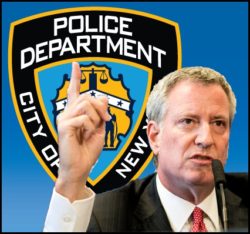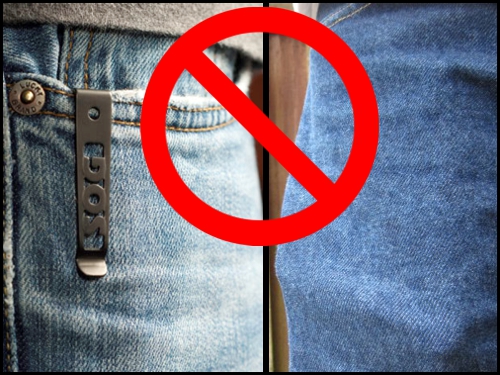
WARNING: NYC has interpreted the state law against gravity knives such that if an officer can “wrist flick” the knife blade open and the knife blade locks open, that knife is an illegal gravity knife. NYC takes this position even if it requires multiple tries and use of exaggerated arm thrust or motion. It does not matter that you cannot “wrist flick” the knife open; if an officer or prosecutor can do so, and they may well be stronger and/or more skilled than you at doing so, you may be arrested. If you have any prior conviction, it will be upgraded to a felony prosecution. Using this interpretation and vague “functional test”, most any lockblade knife might be deemed an illegal gravity knife. May 30, 201:9 Nine years of hard work and effort, including eight years of costly Federal litigation and the threat of losing big time at the U.S. Supreme Court (see below), has finally convinced New York Governor Andrew Cuomo to sign A5944, repealing the state’s bans on Gravity Knives. Although the bill leaves the definition of a gravity knife intact, the statutory repeals make the knives legal, stripping New York City and District Attorney Cyrus Vance, Jr. of their ability to continue to abuse the definition of a gravity knife and continue to arrest and prosecute people by claiming a common lock blade folding knife or utility knife is an illegal gravity knife. The law was effective immediately. Full story about Knife Rights’ huge win at: https://kniferights.org/legislative-update/a-knife-rights-victory-freedom-finally-wins-in-new-york/
 June 2, 2019: Unfortunately, only a few days after enactment unrepentant Mayor Bill de Blasio’ New York Police Department, both of whom strongly opposed the bill, announced that they are unwilling to stop arresting knife carriers. Grasping at straws, they have dug up an archaic, rarely used Metropolitan Transportation Authority regulation (see below) and promised publicly that enforcement will continue on MTA subways.
June 2, 2019: Unfortunately, only a few days after enactment unrepentant Mayor Bill de Blasio’ New York Police Department, both of whom strongly opposed the bill, announced that they are unwilling to stop arresting knife carriers. Grasping at straws, they have dug up an archaic, rarely used Metropolitan Transportation Authority regulation (see below) and promised publicly that enforcement will continue on MTA subways.
June 18, 2019: The Supreme Court of the United States denied Plaintiff’s petition for a Writ of Certiorari, ending eight years of Knife Rights’ federal civil rights litigation against New York City and District Attorney Cyrus Vance, Jr. The Court’s denial would be more disappointing had the strong possibility of being granted Cert not been a major factor pushing Governor Cuomo to sign A5944 just a couple weeks earlier, repealing the state’s gravity knife ban.
Moreover, in their “mootness brief” to SCOTUS the NYPD may have committed, even in the subways (and buses), to no longer using the unconstitutionally vague “wrist flick test” that was at the root of their arrests and prosecutions, as well as our case (a test that was never actually addressed by the courts who avoided dealing with the actual merits of the case in their decisions):
“Pointing to a statement of a New York City Police Department (NYPD) spokesperson, petitioners incorrectly suggest that the NYPD will continue to use the ‘wrist-flick test’ and the definition of a ‘gravity knife’ under N.Y. Penal Law § 265.00(5) to specifically target possession of gravity knives in the subways. But neither point is true. Following the repeal, the NYPD has renounced reliance on the ‘wrist-flick test’ on which petitioners’ constitutional challenge has hinged.”
“…the NYPD does not intend to use the wrist-flick test in enforcing the MTA regulations. Counsel for respondents have been informed by the NYPD, and have been authorized to inform the Court, that the NYPD determined after repeal of the gravity-knife statute that New York City police officers will no longer be trained on, or authorized to use, the wrist-flick test to identify an illegal gravity knife. The NYPD will thus enforce the prohibition of weapons or other dangerous instruments on public transit under t he MTA regulations without reference to whether the weapon constitutes a “gravity knife” as defined under N.Y. Penal Law § 265.00(5) and without reference to the wrist-flick test. That test has been the basis of petitioners’ case since its inception (JA37, 42; Pet. 3, 6-8). The NYPD’s abandonment of the test confirms that petitioners’ core vagueness argument no longer applies.”
Having represented to the Supreme Court of the United States that the NYPD will not use the “wrist flick test” to enforce the gravity knife prohibitions in the subways (and buses), they may be stuck with that position under a doctrine called “judicial estoppel.” Although there is no way to know for sure until the issue is addressed by a court, people who find themselves charged with gravity knife possession in the subway under circumstances where the officer used the “wrist flick test” should consider asking their attorney to argue “judicial estoppel” as part of any defense.
Warning: Absent changes in the MTA code, true gravity knives, like a German paratrooper knife, will remain illegal on subways and buses.
WARNING: On June 10, 2018, the highest court in New York State upheld the conviction of an individual in possession of an assisted opening (spring-assisted) folding knife that he used in his work under the theory that it was an illegal switchblade knife under New York law. Essentially, this decision redefined what a switchblade is under New York State law to include assisted opening (spring-assisted) knives. This decision applies to the entire state, not just New York City. Details at: https://kniferights.org/legislative-update/ny-assisted-openers-switchblades/ Knife Rights recommends that you do not carry an assisted-opening knife in New York. NOTE: The exception is that If treated as a switchblade, they may be possessed for use while hunting, trapping or fishing or en-route to or from those activities by a person with a valid hunting, trapping or fishing license.
WARNING: Note that New York City administrative code has an under-4-inch blade length limit and requires knives be carried COMPLETELY concealed. Knife Rights recommends that you never carry your knife clipped to your pocket in New York City. If you plan to carry a folding knife in New York City, we suggest that if it has a pocket clip, you should remove it so you don’t inadvertently clip it to your pocket after use. Even when covered by a jacket, simply moving the jacket aside to get to a wallet has been enough to get folks violated. Always ensure your knife is completely concealed at all times, including not “printing” on the outside of your clothing. In addition, be extremely circumspect about using a knife for any purpose in a public setting.
WARNING: While enactment of A5944 means true gravity knives, such as the German paratrooper knife, are now legal in NY state, please REVIEW our WARNINGS below about New York City Administrative Code. In particular, some of these aforementioned true gravity knives have blades that are 4-inches or longer and would not be legal in NYC.
NOTE: While there is nothing in the administrative code compelling or allowing seizure of the knife in question, invariably the knife will be taken by the officer. In cases where it has been returned is has taken months of effort and often use of an attorney. We recommend you never carry a knife in NYC that is valuable or that you do not want to lose.
Please contact Knife Rights at nycity@kniferights.org if you are arrested on an illegal knife charge in New York City.
§ 10-133 Possession of knives or instruments.
a. Legislative findings. It is hereby declared and found that the possession in public places, streets and parks of the city, of large knives is a menace to the public health, peace, safety and welfare of the people of the city; that the possession in public places, streets and parks of such knives has resulted in the commission of many homicides, robberies, maimings and assaults of and upon the people of the city; that this condition encourages and fosters the commission of crimes, and contributes to juvenile delinquency, youth crime and gangsterism; that unless the possession or carrying in public places, streets and parks of the city of such knives without a lawful purpose is prohibited, there is danger of an increase in crimes of violence and other conditions detrimental to public peace, safety and welfare. It is further declared and found that the wearing or carrying of knives in open view in public places while such knives are not being used for a lawful purpose is unnecessary and threatening to the public and should be prohibited.
b. It shall be unlawful for any person to carry on his or her person or have in such person’s possession, in any public place, street, or park any knife which has a blade length of four inches or more.
c. It shall be unlawful for any person in a public place, street or park, to wear outside of his or her clothing or carry in open view any knife with an exposed or unexposed blade unless such person is actually using such knife for a lawful purpose as set forth in subdivision d of this section.
d. The provisions of subdivisions b and c of this section shall not apply to (1) persons in the military service of the state of New York when duly authorized to carry or display knives pursuant to regulations issued by the chief of staff to the governor; (2) police officers and peace officers as defined in the criminal procedure law; (3) participants in special events when authorized by the police commissioner; (4) persons in the military or other service of the United States, in pursuit of official duty authorized by federal law; (5) emergency medical technicians or voluntary or paid ambulance drivers while engaged in the performance of their duties; or (6) any person displaying or in possession of a knife otherwise in violation of this section when such knife (a) is being used for or transported immediately to or from a place where it is used for hunting, fishing, camping, hiking, picnicking or any employment, trade or occupation customarily requiring the use of such knife; or (b) is displayed or carried by a member of a theatrical group, drill team, military or para-military unit or veterans organization, to, from, or during a meeting, parade or other performance or practice for such event, which customarily requires the carrying of such knife; or (c) is being transported directly to or from a place of purchase, sharpening or repair, packaged in such a manner as not to allow easy access to such knife while it is transported; or (d) is displayed or carried by a duly enrolled member of the Boy or Girl Scouts of America or a similar organization or society and such display or possession is necessary to participate in the activities of such organization or society.
e. Violation of this section shall be an offense punishable by a fine of not more than three hundred dollars or by imprisonment not exceeding fifteen days or by both such fine and imprisonment.
§ 10-134 Prohibition on sale of certain knives.
a. Legislative findings. It is hereby declared and found that the possession in public places, streets and parks of the city, of folding knives which lock upon opening, is a menace to the public health, peace, safety and welfare of the people of the city; that the possession in public places, streets and parks of such knives has resulted in the commission of many homicides, robberies, maimings and assaults of and upon the people of the city, that this condition encourages and fosters the commission of crimes, and contributes to juvenile delinquency, youth crime and gangsterism; that if this situation is not addressed, then there is a danger of an increase in crimes of violence, and other conditions detrimental to public peace, safety and welfare. It has been found that folding knives with a blade of four (4) inches or more that locks in an open position are designed and used almost exclusively for the purpose of stabbing or the threat thereof. Therefore for the safety of the city, such weapons should be prohibited from sale within the jurisdiction of the city of New York.
b. It shall be unlawful for any person to sell, or offer for sale within the jurisdiction of the city of New York, any folding knife with a blade length of four or more inches which is so constructed that when it is opened it is locked in an open position and cannot be closed without depressing or moving a release mechanism.
c. Exempt from this section are importers and exporters or merchants who ship or receive locking folding knives, with a blade length of four or more inches, in bulk, which knives are scheduled to travel or have travelled in the course of international, interstate, or intrastate commerce to a point outside the city. Such bulk shipments shall remain in their original shipping package, unopened, except for inspection and possible subdivision for further movement in interstate or intrastate commerce to a point outside the city.
d. Violation of this section shall be an offense punishable by a fine of not more than seven hundred fifty dollars ($750) or by imprisonment not exceeding fifteen days (15) or both such fine and imprisonment. Any person violating this section shall be subject to a civil penalty not to exceed one thousand dollars for each violation.
New York Codes, Rules, and Regulations; Title 21 – Miscellaneous; Chapter XXI – Metropolitan Transportation Authority; Subchapter D – Rules and Regulations Governing the Conduct and Safety of the Public (emphasis ours):
Section 1050.8 Weapons and other dangerous instruments.
(a) No weapon, dangerous instrument, or any other item intended for use as a weapon may be carried in or on any facility or conveyance. This provision does not apply to law enforcement personnel and persons to whom a license for such weapon has been duly issued and is in force (provided in the latter case the weapon is concealed from view). For the purposes hereof, a weapon or dangerous instrument shall include, but not be limited to, a firearm, switchblade knife, gravity knife, boxcutter, straight razor or razor blades that are not wrapped or enclosed in a protective covering, sword, shotgun or rifle.
Section 1050.10 Fine and penalties.
Pursuant to section 1204(5-a) of the Public Authorities Law, any person committing one or more violations of these rules shall be subject to either:
(a) criminal prosecution in the criminal court of the City of New York, which court may impose a fine not to exceed twenty-five dollars or a term of imprisonment for not longer than ten days, or both; or
(b) civil penalties imposed by the transit adjudication bureau in an amount not to exceed one hundred dollars per violation (exclusive of interest or costs assessed thereon).



